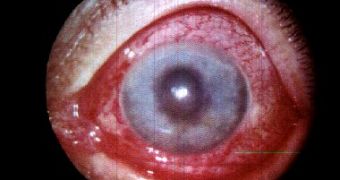Aging comes with an array of severe issues; now two of them have been connected. Plaques similar to those encountered in the brains of people with Alzheimer's disease (AD) - the most common form of senile dementia - may be linked to the nerve damage of glaucoma; however, drugs employed in AD treatment were found to work against glaucoma.
Glaucoma produces the degeneration of the optic nerve (and consequently blindness, being the main cause of age related blindness) and it has been blamed on higher pressure within the eyeball. For quite a long time now, it was assumed that increased intraocular pressure destroys the retinal ganglion cells (RGCs), the nerve cells that take signals from retina and transmit them to the brain.
But glaucoma often gets worse even after the drugs used in the treatment of intraocular pressure have been prescribed. But some recent researches have discovered that in case of glaucoma, RGCs overproduces a protein named ?-amyloid, on which brain plaques in AD are built up.
Other research has discovered that AD patients are much more prone to RGC damage and loss of vision.
Now, the team led by ophthalmologist Francesca Cordeiro of University College London induced glaucoma in rats, finding a higher ?-amyloid amount in RGCs, especially in the deceased cells.
In another approach, the team injected a ?-amyloid subunit, toxic to the central nervous system, into the eyes of healthy rats (without glaucoma). The death toll of RGCs was linked to the protein amount.
In their last experiment, the researchers injected three different chemicals that block plaque formation, including one currently employed in AD treatment, in rats with glaucoma. Each one decreased plaque buildup and RGC death, but their combination had the strongest effect. It appears that chemicals used against ?-amyloid could effectively cure glaucoma, which is now treated by decreasing the intraocular pressure. "?-amyloid plaque formation may be a "shared pathway" that causes AD and glaucoma," said Cordeiro. "The new findings confirm the suspected link between AD and glaucoma," said Hideaki Hara, a glaucoma researcher at Gifu Pharmaceutical University in Japan.
Others consider that more studies should be made. "?-amyloid might still turn out to be an indirect cause of RGC death. Further studies are necessary to show that there is a direct effect as well as a link between the mechanisms behind glaucoma and Alzheimer's disease." said Pervin Iseri, a neurologist at Kocaeli University in Umuttepe, Turkey.

 14 DAY TRIAL //
14 DAY TRIAL //